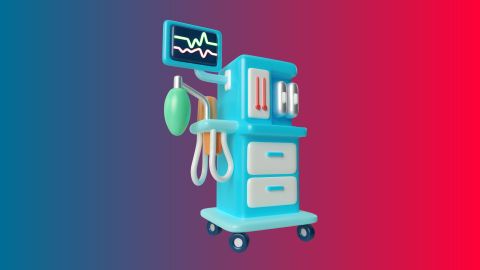Magnetic Resonance Imaging (MRI) scanners are vital diagnostic tools that produce high-resolution images of the body’s internal structures without the use of harmful radiation. They are instrumental in identifying a wide range of medical conditions, from neurological disorders to musculoskeletal injuries. This guide explains the core principles of MRI technology, its working process, the different types of MRI machines available, pricing trends in India, and key considerations before making a purchase. Whether you are a healthcare provider planning to invest in an MRI machine or someone seeking to understand the technology, this article offers practical insights, including financing options to help facilitate your acquisition.
What is an MRI scanner?
An MRI scanner is a powerful medical imaging device that produces high-quality images of the body's internal structures without the use of ionising radiation. It consists of a large and powerful magnet, a computer, and a radiofrequency system. The machine generates a strong magnetic field that aligns the protons in the body's cells, which can then be manipulated using radiofrequency waves to produce images with remarkable clarity and detail.
How does an MRI scanner work?
Here’s how an MRI scanner works:
- Patient positioning: The individual lies on a padded table that smoothly slides into the MRI scanner.
- Magnetic field activation: The machine generates a strong magnetic field, aligning hydrogen atoms in the body’s cells in a single direction.
- Radio wave application: A radio wave pulse is applied, disturbing this alignment and causing the atoms to shift position.
- Signal emission: When the pulse stops, the atoms return to their original state, emitting signals detected by the scanner’s sensors.
- Image construction: Advanced computer algorithms process these signals to create detailed internal body images.
- Scan duration: Depending on the body part being examined, the process can take from a few minutes to over an hour.
Uses of an MRI Machine
Here are some common situations where an MRI scanner may be used:
- Brain and spinal cord conditions: Detecting abnormalities, injuries, or neurological disorders.
- Tumours and cysts: Identifying growths or unusual structures in different parts of the body.
- High-risk breast cancer screening: Monitoring women with an elevated risk of developing breast cancer.
- Joint injuries or issues: Examining conditions affecting the back, knee, and other joints.
- Heart disorders: Assessing certain types of cardiovascular problems.
- Abdominal organ diseases: Diagnosing conditions of the liver and other internal organs.
- Pelvic pain in women: Investigating causes such as fibroids or endometriosis.
- Uterine abnormalities: Detecting potential structural issues during infertility evaluations.
Applications of MRI scanner
Although MRI scanners are primarily used in clinical settings for medical diagnosis, they have found applications in various industries, including manufacturing, research and development, and agriculture. The technology is compatible with various subjects, including metal structures, which make it a good option in the manufacturing industry for non-destructive testing, in identifying corrosive spots, and other internal defects in the structure. MRIs are useful in pre-clinical studies of animals, drug development, and research in microbiology. In homecare or rehabilitation centres, supporting diagnostic setups with a hospital bed ensures greater comfort for patients undergoing routine scans.
Types of MRI machines
MRI machines come in different sizes and with varying specifications, depending on the manufacturer, and intended use.
Here are some common ones:
- Closed-bore MRI: It is the traditional kind with a big tube. Patients lie on a table that goes into the tube. It gives good pictures, but some people might feel claustrophobic.
- Open MRI: These have a more open design, so they are less confining. They are good for larger patients or those who can't lie flat. The pictures might not be as clear as closed-bore MRI.
- Wide-bore MRI: They are like a mix of closed-bore and open MRI. They have more space but still give good pictures.
- High-field MRI: These have stronger magnetic fields, so they give better pictures. They are often used for detailed imaging of the brain, spine, and joints.
- Low-field MRI: They have weaker magnetic fields but can be cheaper. They are used when super clear pictures aren't needed.
- Portable MRI: These are small and can be moved around. They are handy for places where regular MRI machines cannot go, like emergency rooms or remote areas. Portable imaging systems are sometimes paired with oxygen concentrators for respiratory support in remote diagnostics.
Prices of MRI Machine in India according to brands
S. No. |
Best MRI Machine Brands |
Price Range (Rs) |
1 |
Siemens |
Rs 2,00,00,000 - Rs 7,00,00,000 |
2 |
Philips |
Rs 3,00,00,000 - Rs 10,00,00,000 |
3 |
GE Healthcare |
Rs 2,50,00,000 - Rs 6,00,00,000 |
Features affecting the price of an MRI Machine
Several factors can influence the cost of an MRI machine, depending on its capabilities and specifications:
- Magnet field strength: Higher magnetic field strength produces more detailed images. Most systems are 1.5T or 3.0T, with 3.0T machines generally costing around 25% more.
- Bore size: A 70 cm “wide bore” system offers better patient comfort compared to the standard 60 cm bore. These tend to be newer and can cost up to 50% more.
- Multi-channel capability: More RF channels improve image clarity and acquisition speed. In 1.5T systems, 48 channels or higher is ideal for optimal performance.
- Coil set: Additional coils designed for specific studies enhance versatility but increase overall cost.
- Specialised options: Features like AI integration, whole-body imaging, or advanced neurological study capabilities can raise the price significantly.
Factors to consider before buying an MRI Machine
Listed below are some factors to evaluate when purchasing an MRI machine:
- Magnetic field strength: MRI scanners are available in strengths like 1.5T, 3T, and 7T, each catering to different diagnostic needs. Selecting the right strength ensures accurate imaging for your specific medical applications.
- Channels: Machines can have 4, 8, 16, 32 or more channels. A higher number of channels results in clearer images and faster scans, improving efficiency in clinical settings.
- Brand: Well-known brands such as GE and Philips are trusted for quality and reliability. Comparing models from different manufacturers helps ensure you choose the right combination of performance and durability.
- MRI scanner type: Different settings such as hospitals, clinics, or specialised centres require specific scanner types. Selecting the right type ensures the machine meets both patient comfort and diagnostic requirements.
Explore financing options on an MRI machine
Business owners who consider investing in an MRI machine need financing. For those planning to apply, understanding the medical equipment finance eligibility criteria can help streamline the loan process and improve your approval chances. Financing options such as loans are readily available from Bajaj Finserv Medical Equipment Finance, which provides healthcare providers with the financial support they need to invest in state-of-the-art medical devices and equipment. Additionally, evaluating the medical equipment finance interest rate can help you plan better repayment strategies and compare loan offers. Business owners can take advantage of these options to invest in MRI machines and enjoy the benefits that come with owning one. For those looking to expand their infrastructure alongside equipment investment, applying for hospital loans can provide comprehensive financial backing.




